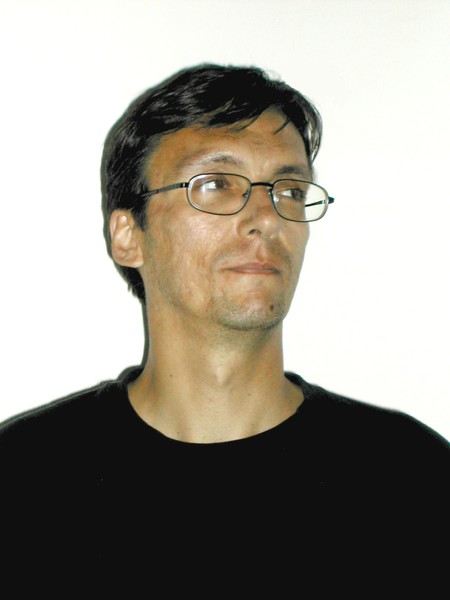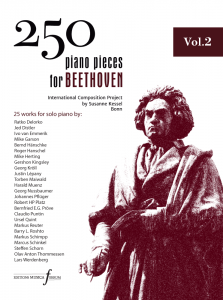Adrian Gagiu (RO) – Große Bagatelle
Adrian Gagiu about his piano piece “Große Bagatelle”
“The title of this neo-classical piano piece already suggests irony, which was also one of Beethoven’s less obvious aspects. Of course, here it is aimed not at Beethoven, but at a certain simplistic, popular view about some of his more famous works. Thus, its themes allude more or less transparently, from a postmodern point of view, to his Fifth Symphony, “Für Elise” and Ninth Symphony, but also to some of his last compositions in their particular genre (String Quartet op. 135, Diabelli Variations, Piano Sonata op. 111, and Piano Bagatelle op. 126 no. 6).
The first notes of the harsh, ominous main theme, presented in violent unison, are based on the corresponding German notation for the letters of his last name, adding another B, or B flat, for the similar sounding V, and two others from solmization (H, or B natural, for T, ti; and C, do, for the similar sounding O). The piece is in ternary form with sonata elements, and its initial rage dissolves in overt irony, which in turn gives way to strangeness and to a mysterious, restrained development in the central, contemplative section (Adagio).
The modified and condensed recapitulation returns to violent outbursts and high energy and even makes use of the Classical sonata key relationship, but with the same sudden contrasts, chromaticism of the main theme, and Dorian hints (amplifying Beethoven’s own from some of his late works). Finally, the enigma of the main theme is solved by integrating it in a peculiar, soft cadence in C major which starts with a German sixth chord in D minor. What was real: rage, irony, or contemplation? Thus, thematic and formal irony, radical mood changes and the various lights being put on the “Beethoven motif” suggest a certain detachment from the game which is typical of late Beethoven.”
Adrian Gagiu about Ludwig van Beethoven:
“Beethoven is the greatest composer who ever lived (because Bach is superhuman and Mozart hides his genius behind grace). He is one of the main reasons I started composing. His supreme organicity, coherence and aspiration to surpass oneself and everything should be a model for any style and for anyone.“
Piano piece “Große Bagatelle” – in concert:
21st January 2018 – world premiere – Klavierhaus Klavins, Bonn – Susanne Kessel, piano
Adrian Gagiu (*1967)
Adrian Gagiu is a Romanian composer of symphonic, chamber, vocal and electronic music, mostly in the neo-classical tradition and indebted to Beethoven and Prokofiev, but also rooted in his country’s ancient heritage.
While he is self-taught and has started composing first in imagination since he was 14 and then properly on paper since the age of 20, he has taken musical benefit from handbooks, extensive listening, and private talks with various composers such as Remus Georgescu, and also from attending master classes in orchestral conducting led by Ervin Acél. His output includes over 210 compositions so far, out of which some have been performed in Romania, Brazil and Ukraine, and he has provided the soundtrack, in Ambient style, for the art film “Tracking Happiness” (2009) by Mircea Cantor (shown in various art museums in Switzerland, Germany, Austria, France, USA, Australia etc).
Among his more remarkable compositions there are seven symphonies (no. 3 with choir and text from Goethe’s “Faust” and Dante’s “Divina commedia”; no. 4 based on Beethoven’s sketches for his Tenth), a violin concerto (commissioned by violinist Peter Rosenberg), two string quartets, a string trio, three piano sonatas, a piano suite, two operas in English (“Hamlet”, “The Brute”), two masses, two cantatas, nine motets, a song cycle on poems by Eminescu, a Fantasia for organ, and five albums of electronic music in “holy minimalist” style.


